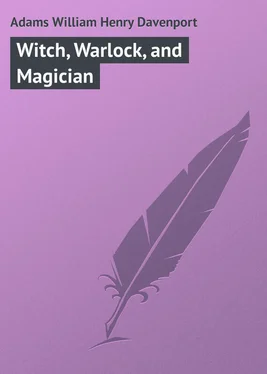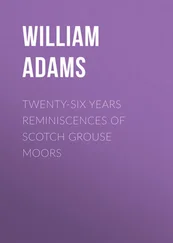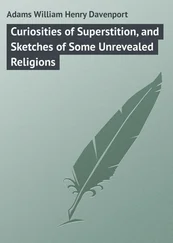William Adams - Witch, Warlock, and Magician
Здесь есть возможность читать онлайн «William Adams - Witch, Warlock, and Magician» — ознакомительный отрывок электронной книги совершенно бесплатно, а после прочтения отрывка купить полную версию. В некоторых случаях можно слушать аудио, скачать через торрент в формате fb2 и присутствует краткое содержание. Жанр: foreign_prose, foreign_language, на английском языке. Описание произведения, (предисловие) а так же отзывы посетителей доступны на портале библиотеки ЛибКат.
- Название:Witch, Warlock, and Magician
- Автор:
- Жанр:
- Год:неизвестен
- ISBN:нет данных
- Рейтинг книги:3 / 5. Голосов: 1
-
Избранное:Добавить в избранное
- Отзывы:
-
Ваша оценка:
- 60
- 1
- 2
- 3
- 4
- 5
Witch, Warlock, and Magician: краткое содержание, описание и аннотация
Предлагаем к чтению аннотацию, описание, краткое содержание или предисловие (зависит от того, что написал сам автор книги «Witch, Warlock, and Magician»). Если вы не нашли необходимую информацию о книге — напишите в комментариях, мы постараемся отыскать её.
Witch, Warlock, and Magician — читать онлайн ознакомительный отрывок
Ниже представлен текст книги, разбитый по страницам. Система сохранения места последней прочитанной страницы, позволяет с удобством читать онлайн бесплатно книгу «Witch, Warlock, and Magician», без необходимости каждый раз заново искать на чём Вы остановились. Поставьте закладку, и сможете в любой момент перейти на страницу, на которой закончили чтение.
Интервал:
Закладка:
That direful plagues and mischief fall on thee.
Miles. ’Tis no matter, I am against you with the old proverb, ‘The more the fox is cursed, the better he fares.’ God be with you, sir: I’ll take but a book in my hand, a wide-sleeved gown on my back, and a crowned cap 19 19 A corner or college cap.
on my head, and see if I can merit promotion.
Bacon. Some fiend or ghost haunt on thy weary steps,
Until they do transport thee quick to Hell!
For Bacon shall have never any day,
To lose the fame and honour of his Head.
[Exeunt.Scene XII. passes in King Henry’s Court, and the royal consent is given to Earl Lacy’s marriage with the Fair Maid, which is fixed to take place on the same day as Prince Edward’s marriage to the Princess Elinor. In Scene XIII. we again go back to Bacon’s cell. The friar is bewailing the destruction of his Brazen Head to Friar Bungay, when two young gentlemen, named Lambert and Sealsby, enter, in order to look into the ‘glass prospective,’ and see how their fathers are faring. Unhappily, at this very moment, the elder Lambert and Sealsby, having quarrelled, are engaged ‘in combat hard by Fressingfield,’ and stab each other to the death, whereupon their sons immediately come to blows, with a like fatal result. Bacon, deeply affected, breaks the magic crystal which has been the unwitting cause of so sad a catastrophe, expresses his regret that he ever dabbled in the unholy science, and announces his resolve to spend the remainder of his life ‘in pure devotion.’
At Fressingfield, in Scene XIV., the opportune arrival of Lacy and his friends prevents Margaret from carrying out her intention of retiring to the nunnery at Framlingham, and with obliging readiness she consents to marry the Earl. Scene XV. shifts to Bacon’s cell, where a devil complains that the friar hath raised him from the darkest deep to search about the world for Miles, his man, and torment him in punishment for his neglect of orders.
Miles makes his appearance, and after some comic dialogue, intended to tickle the ears of the groundlings, mounts astride the demon’s back, and goes off to – ! In Scene XVI., and last, we return to the Court, where royalty makes a splendid show, and the two brides – the Princess Elinor and the Countess Margaret – display their rival charms. Of course the redoubtable friar is present, and in his concluding speech leaps over a couple of centuries to make a glowing compliment to Queen Elizabeth, which seems worth quotation:
‘I find by deep prescience of mine art,
Which once I tempered in my secret cell,
That here where Brute did build his Troynovant, 20 20 An allusion to the old legend that Brut, or Brutus, great-grandson of Æneas, founded New Troy (Troynovant), or London.
From forth the royal garden of a King
Shall flourish out so rich and fair a bud,
Whose brightness shall deface proud Phœbus’ flower,
And overshadow Albion with her leaves.
Till then Mars shall be master of the field,
But then the stormy threats of war shall cease:
The horse shall stamp as careless of the pike,
Drums shall be turned to timbrels of delight;
With wealthy favours Plenty shall enrich
The strand that gladded wandering Brute to see,
And peace from heaven shall harbour in these leaves
That gorgeous beautify this matchless flower:
Apollo’s heliotropian 21 21 Probably the reference is to the sunflower.
then shall stoop,
And Venus’ hyacinth 22 22 The classic writers usually identify the hyacinth with Apollo.
shall vail her top;
Juno shall shut her gilliflowers up,
And Pallas’ bay shall ’bash her brightest green;
Ceres’ carnation, in consort with those,
Shall stoop and wonder at Diana’s rose.’ 23 23 The rose, that is, of the Virgin Queen – an English Diana – Elizabeth. In Shakespeare’s ‘Midsummer Night’s Dream’ (Act iv., scene 1) we read of ‘Diana’s bud.’
So much for Greene’s comedy of ‘Friar Bacon and Friar Bungay’ – not, on the whole, a bad piece of work.
Among the earlier English alchemists I may next name, in chronological order, George Ripley, canon of Bridlington, who, in 1471, dedicated to King Edward III. his once celebrated ‘Compound of Alchemy; or, The Twelve Gates leading to the Discovery of the Philosopher’s Stone.’ These ‘gates,’ each of which he describes in detail, but with little enlightenment to the uninitiated reader, are: – 1. Calcination; 2. Solution; 3. Separation; 4. Conjunction; 5. Putrefaction; 6. Congelation; 7. Cibation; 8. Sublimation; 9. Fermentation; 10. Exaltation; 11. Multiplication; and 12. Projection. In his old age Ripley learned wisdom, and frankly acknowledged that he had wasted his life upon an empty pursuit. He requested all men, if they met with any of the five-and-twenty treatises of which he was the author, to consign them to the flames as absolutely vain and worthless.
Yet there is a wild story that he actually discovered the ‘magisterium,’ and was thereby enabled to send a gift of £100,000 to the Knights of St. John, to assist them in their defence of Rhodes against the Turks.
Thomas Norton, of Bristol, was the author of ‘The Ordinall of Alchemy’ (printed in London in 1652). He is said to have been a pupil of Ripley, under whom (at the age of 28) he studied for forty days, and in that short time acquired a thorough knowledge of ‘the perfection of chemistry.’ Ripley, however, refused to instruct so young a man in the master-secret of the great science, and the process from ‘the white’ to ‘the red powder,’ so that Norton was compelled to rely on his own skill and industry. Twice in his labours a sad disappointment overtook him. On one occasion he had almost completed the tincture, when the servant whom he employed to look after the furnace decamped with it, supposing that it was fit for use. On another it was stolen by the wife of William Canning, Mayor of Bristol, who immediately sprang into immense wealth, and as some amends, I suppose, for his ill-gotten gains, built the beautiful steeple of the church of St. Mary, Redcliffe – the church afterwards connected with the sad story of Chatterton. As for Norton, he seems to have lived in poverty and died in poverty (1477).
The ‘Ordinall of Alchemy’ is a tedious panegyric of the science, interspersed with a good deal of the vague talk about white and red stones and the philosophical magnesia in which ‘the adepts’ delighted.
To Norton we owe our scanty knowledge of Thomas Dalton, who flourished about the middle of the fifteenth century. He had the reputation of being a devout Churchman until he was accused by a certain Debois of possessing the powder of projection. Debois roundly asserted that Norton had made him a thousand pounds of gold (lucky man!) in less than twelve hours. Whereupon Dalton simply said, ‘Sir, you are forsworn.’ His explanation was that he had received the powder from a canon of Lichfield, on undertaking not to use it until after the canon’s death; and that since he had been so troubled by his possession of it, that he had secretly destroyed it. One Thomas Herbert, a squire of King Edward, waylaid the unfortunate man, and shut him up in the castle of Gloucester, putting heavy pressure upon him to make the coveted tincture. But this Dalton would not and could not do; and after a captivity of four years, Herbert ordered him to be brought out and executed in his presence. He obeyed the harsh summons with great delight, exclaiming, ‘Blessed art Thou, Lord Jesus! I have been too long absent from Thee. The science Thou gavest me I have kept without ever abusing it; I have found no one fit to be my heir; wherefore, sweet Lord, I will restore Thy gift to Thee again.’
Читать дальшеИнтервал:
Закладка:
Похожие книги на «Witch, Warlock, and Magician»
Представляем Вашему вниманию похожие книги на «Witch, Warlock, and Magician» списком для выбора. Мы отобрали схожую по названию и смыслу литературу в надежде предоставить читателям больше вариантов отыскать новые, интересные, ещё непрочитанные произведения.
Обсуждение, отзывы о книге «Witch, Warlock, and Magician» и просто собственные мнения читателей. Оставьте ваши комментарии, напишите, что Вы думаете о произведении, его смысле или главных героях. Укажите что конкретно понравилось, а что нет, и почему Вы так считаете.











